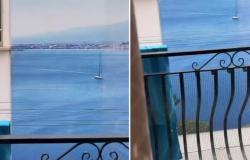
A backpack with a change of clothes and a cell phone are the only belongings with which Carlos Trotta, 82 years oldjoins the so-called Freedom Flotilla that seeks bring humanitarian aid to Gaza. The members of the boats do not even carry cutlery or anything sharp, but in addition, since they do not know how their trip will end, they do not carry valuable things in case they have to abandon them if they are forced to disembark in an Israeli port, as has already happened. happened. This Sunday, Carlos will be the only Argentine who will be part of a new ship with hundreds of activists from all over the world, who will leave from Turkey with the objective of bringing 5,500 tons to Gazan territory., between food and basic needs products, in the midst of the massive Israeli offensivewhere around 34 thousand Palestinians were murdered and where they denounce that famine could increase that number.
“This is absolutely humanitarian, from human being to human being”explained to The uncoveringhe Surgeon by saying that all they want is to bring aid to the Palestinians in Gaza. Carlos highlights the issue of assistance because he maintains that They try to establish that the Freedom Flotilla has ties to Hamas and, with that argument, it has already happened that they are prevented from disembarking and delivering aid. The most emblematic case was that of the Mavi Marmara shipment in 2010, when Israeli forces intercepted them and murdered 10 activists and injured dozens. ““I am sure that the flotilla would go to help the Israelis, but at this moment those who are having an absolutely bad time, in an undignified way, are the Palestinian people.”Trotta added.
We do this project collectively. Support El Destape with a click here. Let’s continue making history.
SUBSCRIBE TO THE DISCOVERY
In interview with The uncoveringCarlos said that was in Gaza in 2009 when he didn’t know much about the subject and that trip marked him. He Mar del Plata, who is a member of Doctors Without Borders Although it is no longer part of its missions, it was in several countries with conflicts such as Syria, Yemen or Haiti. On this occasion, when asked why instead of enjoying his retirement he decided to go to war, in addition to joking about pensions, he responded: “The Hippocratic Oath tells us that every wounded person deserves to be cared for beyond ideas.” political, cultural or religious that one may have. What will I do if I see an injured person? If I see that she is being attacked? What if I see that she is being bombed in a hospital? I am healthy, it is the best I can do with my health since I have had the opportunity to reach my 82nd birthday well. What do you want me to do? “Let me stay fishing in Mar del Plata?”
– The first obvious question is: why and how did you decide to join the Freedom Flotilla?
– In my case, it is a question that has arisen many times, even from colleagues who ask me why, and the answer that seems to best reflect my situation is to return the question to them and tell them, especially to my medical colleagues or healthcare workers. health, why not? Obviously I believe that within the task that we do, in my case as a surgeon, this type of accompaniment is implicit. I wouldn’t say help, I don’t really like that word either, but I would accompany someone who is having a hard time and, if we can also provide some type of technical support, of course that is important.
So why and why not? We are seeing on television, live and direct, what is happening in Gaza, which has been classified by international organizations as a true genocide that is carried out with weapons and, now, through hunger, which is absolutely intolerable. So it is absurd for anyone to try to ask why, because the answer is obvious. There is a drama and the Secretary of the United Nations, Antonio Guterres, said it very clearly: “We are not only in the presence of a humanitarian crisis, but a crisis of humanity.” That’s what it’s about.
– Is there fear of what may happen, especially because of what has happened? How do you make it?
– The response of the Freedom Flotilla now attempts, on the one hand, to overcome the blockade to which Gaza is subjected and, fundamentally, to provide concrete aid in the form of five thousand five hundred tons of medicines, food, and generating equipment. In short, all the needs for critical situations like these. What is happening? If they let humanitarian aid in or not? I have the same information that we all handle. What is going to happen to the fleet? The possibilities are many and they are all considered.
We are absolutely prohibited from carrying anything sharp. Nothing, not even a small scissors or pliers. It’s to make it clear that there is no weapon or anything like that, I mean, because of other things that have happened in the past. We cannot even carry cutlery, forks, knives. We will eat with our hands, I don’t know how we will manage. The other thing is that the propaganda has already started, as I understand it, and it is in the same sense as always: they say that the Freedom Flotilla actually wants to help Hamas, that the Flotilla and the activists are anti-Semitic, which is absolutely absurd. And it is already, at this point in time, an argument that has lost all validity. This is absolutely humanitarian, from human being to human being and, if it happened tomorrow that the Israelis were going through something like this, I am sure that the flotilla would go to help the Israelis, but at this moment those who are going through it Absolutely wrong, in an unworthy way, are the Palestinian people.
– You have already been to Gaza, what was that experience like?
– It is another reason why I intend to return. I was there in 2009, January and February 2009, when an Israeli incursion was taking place that was called Operation Cast Lead. Back then, not with the magnitude of now, but back then 1,400 Palestinians died, of which 300 were children. I was working at Al Shifa Hospital, which at this moment I think is completely destroyed. It was a huge hospital with 400 beds, where work was done 24 hours a day, 7 days a week.
He was a person who did not really have much information about the Palestinian issue, like I think most of our people who do not have clear information, or worse still, are not only not informed but are falsely informed. Simply when I saw what was happening on television in December 2008, I called the surgeon’s headquarters there in Buenos Aires and asked them if I needed a vascular surgeon. They told me yes, so they immediately sent me there. We had a little difficulty getting in, but finally we were able to do it and that’s where the chip fell for me. I found a reality that I did not know and the same increased severity that is seen now, that is why when they want to put the axis on October 7 or that it began on October 7 (with the Hamas attack on Israel), that is not the case. since before there were bombings and everything else. Bombings that, on the other hand, do not even respect international law or the rules of war themselves because war, with all its brutality, has rules and you cannot bomb hospitals, ambulances, patients, health personnel, journalists. There are a huge number of journalists who have been murdered, I think close to 100.
I witnessed it, I saw it personally in 2009. Even long before the absolute and total blockade, the people of Gaza cannot move anywhere. The Gaza connection is surrounded on all sides by Israel with a wall that is around 700 kilometers long, with a structure several meters high with watchtowers every few distances. It is also true that Gaza could communicate with Egypt through Rafah and that is closed or opens in dribs and drabs. It is an open-air prison and I think it is worse than a prison because in a prison the treatment is very cruel, but every so often they give you a little water or bread, something that does not happen in Palestine. Furthermore, in a prison there are generally people who have broken the law, which is not the case with the Palestinian people because we are talking about the Palestinian people, we are not talking about any armed faction.
– You who have been in other conflicts such as Yemen, Syria or Haiti, is it comparable to what is seen in Gaza?
– In Gaza they have had to amputate children without anesthesia and that is terrible. It’s not just about having to leave a child amputated, but then you have to tell them that they no longer have a family, no dad, no mom, no siblings, or anything. It’s very cruel. Let’s imagine what the future is for those who eventually survive the war, the psychological and mental scars. Apart, of course, from the physics that remain forever. Furthermore, there will remain a grudge that is very difficult to erase. It is difficult to understand how we as human beings are, that we are embarking on this type of conflict and that it is becoming natural because we are witnessing live and direct what is happening and each time we are surrounding ourselves with a worse ethical and moral situation.





